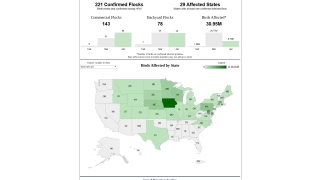U.S. Prepares for the Next Pandemic Influenza Outbreak

New Jersey-based Seqirus announced today that the U.S. Food and Drug Administration (FDA) granted supplemental approval of a multi-dose vial presentation of the AUDENZ™ pandemic influenza vaccine.
AUDENZ is the first-ever adjuvanted, cell-based influenza vaccine designed to help protect individuals six months of age and older against influenza A(H5N1) in the event of a pandemic.
The U.S. FDA initially approved this novel influenza vaccine in February 2020 in a single dose, prefilled syringe presentation.
Under the terms of a public-private partnership established in 2009, Seqirus positioned itself to deliver 150 million influenza vaccine doses to the U.S. government to support an influenza pandemic response.
"Producing AUDENZ in multi-dose vials allows for increased speed and efficiency, which is absolutely critical to help protect public health in the case of an influenza pandemic," said Marc Lacey, Executive Director, Pandemic Response Solutions, Seqirus, in a press release.
"According to the U.S. CDC, the influenza A(H5N1) virus is highly pathogenic and has high pandemic potential, so it's critical to be prepared.
Pandemic influenza is a contagious airborne respiratory disease that is unpredictable in timing and severity and is different from the annual flu virus, avian influenza, and swine influenza says the CDC.
Currently, there is no circulating strain of any A(H2Nx) influenza virus in humans.
The risk of influenza-associated morbidity and mortality is greater with pandemic influenza than with seasonal influenza because there is likely little or no pre-existing immunity to the virus in the human population.
Four influenza pandemics have occurred over the past century, with the 1918 pandemic being the most severe in recent history, estimated to have killed up to 50 million people worldwide.
According to the CDC, a novel influenza A virus such as the highly pathogenic avian A(H5N1) strain can cause severe disease and high mortality rates.
If the influenza A(H5N1) virus were to change and become easily transmissible from person to person while retaining its capacity to cause severe disease, the consequences for public health could be very serious, with an approximate 60% mortality rate.
For example, H2Nx strains circulated in avian reservoirs and triggered the 1957 pandemic, which caused an estimated 1.1 million deaths worldwide and 116,000 deaths in the United States.
AUDENZ combines Seqirus' proprietary MF59® adjuvant technology with its cell-based manufacturing platform. Cell-based manufacturing, an alternative to traditional egg-based manufacturing, avoids egg-adapted changes, a source of strain mismatch between the vaccine and circulating influenza virus.
Influenza vaccines using the MF59® adjuvant are designed to enhance and broaden the body's immune response by creating broad, cross-reactive antibodies.
This adjuvant is an essential part of pandemic preparedness planning as it reduces the amount of antigen required to produce an immune response, increasing the number of doses of the vaccine developed so that a large number of people can be vaccinated as quickly as possible.
Since 2009, Seqirus has had a longstanding partnership with the U.S. government.
In partnership with the U.S. government, Seqirus and its legacy companies have developed vaccines against 12 different pre-pandemic strains since 2006, including H5, H7, and H1.
In October 2021, Seqirus announced a new $34.95 million agreement with Biomedical Advanced Research and Development Authority to develop two influenza A(H2Nx) virus vaccines:
- The first using the adjuvanted, cell-based combination platform technology used by AUDENZ™
- The second is using Seqirus' next-generation self-amplifying mRNA (sa-mRNA) platform. Seqirus’ sa-mRNA platform, the next-generation version of today’s mRNA technology, builds on traditional mRNA technology by instructing the body to replicate mRNA, amplifying the amount of protein made.
Both cell-based and sa-mRNA technology are steps forward in achieving critical objectives found in the U.S. National Influenza Vaccine Modernization Strategy, which focuses on strengthening and diversifying influenza vaccine development, manufacturing, and supply chain.
Furthermore, Seqirus holds agreements with 30 governments to provide a strain-matched vaccine in the event of an influenza pandemic.
Seqirus is based in Summit, New Jersey and is part of CSL Limited, one of the largest influenza vaccine providers in the world.
PrecisionVaccinations publishes fact-checked research-based vaccine news.
Our Trust Standards: Medical Advisory Committee
- Seqirus Announces U.S. FDA Approval for Multi-Dose Vial Presentation of First-Ever Adjuvanted, Cell-Based Pandemic Influenza Vac
- Seqirus Awarded U.S. Government Contract to Develop Two Pandemic Influenza Vaccines
- National Influenza Vaccine Modernization Strategy (NIVMS) 2020-2030
- Audenz Influenza A(H5N1) Vaccine
























